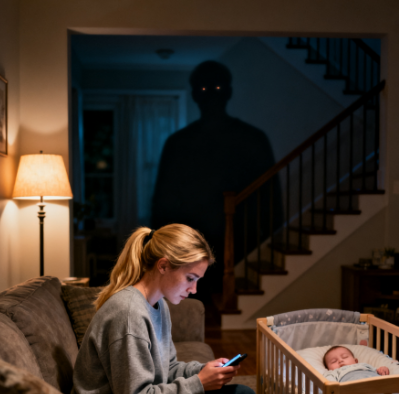
Carol and Mike Jenkins, 62 and 64, had waited years to adopt Lily, now 18 months old—and never left her with anyone but family. When Mike’s sister invited them to her 40th birthday dinner in the city, they hired Mia, a 22-year-old college student with glowing references who made Lily giggle instantly. Still, Carol fretted. “I’ll check the security app once,” she told Mike as they left. “Just to be sure.”
Dinner was lovely—stories of Mike’s childhood, his sister cooing over Lily’s photo—but halfway through dessert, Carol pulled out her phone. The living room footage showed Mia on the floor with Lily, who played with her stuffed rabbit. Next to Mia: an open notebook, and she was writing in it. “Is she taking notes?” Carol said, showing Mike. “Maybe Lily’s bedtime routine?” he guessed. “Her references said she’s organized.”
Carol wasn’t sold. She fast-forwarded: Mia fed Lily peas, pausing to jot down notes; later, she flipped through the notebook on the couch, smiling. “What’s she writing?” Carol said. “About Lily? About us?” Mike urged patience, but Carol couldn’t focus. All she thought about was that notebook.
They got home at 10 p.m. Lily slept in her crib; Mia sat reading. “She was perfect,” Mia said. “Ate all her peas, bathed easily, fell asleep to your lullaby. I left a note on the fridge about her—toe tickles are her favorite.” Carol’s eyes darted to the empty coffee table. “Did you bring a notebook?” she asked. Mia’s smile flickered. “Oh, yeah—I keep a journal for the kids I babysit. Favorite games, what they eat. So if I come back, I pick up where we left off. Sorry I didn’t mention it.”
Relieved but curious, Carol and Mike watched the full footage after Mia left. They saw Mia play with Lily, bathe her, sing—and every note matched a sweet moment: Lily saying “mama,” stacking blocks, kissing her rabbit. Then, after Lily slept, Mia wrote in the notebook, then held it up to the camera. They leaned in, reading her handwriting:
“Lily, 18 months. Loves peas, hates carrots. Laughs at toe tickles. ‘Mama’ when happy, ‘dada’ to play. Her parents love her in every little thing—her folded blanket, the lullaby note, how they talked about her. I hope if I have kids, I love them half as much. Thank you for letting me be here.”
Tears filled Carol’s eyes. “I was so paranoid,” she said. Mike hugged her. “You’re a mom—worrying’s part of it. But we found a good one.”
The next morning, Carol called Mia. “I watched the footage,” she said. “Your notebook was so sweet. Thank you.” Mia laughed. “My grandma taught me—she babysat 40 years, wrote down kid stories. She even went to one’s wedding. I want to remember the little things.”
Carol thought of her parents’ childhood scrapbook—ticket stubs, first words—and bought a sparkly pink notebook: “Lily’s Story, by Mom and Dad.” Every night, she and Mike wrote down Lily’s day: new words, silly faces, photos of her covered in cake or playing in snow.
Mia babysat monthly, bringing her notebook. After Lily slept, she’d share: “Lily said ‘rabbit’ today!” “She fed her bear peas!” “She danced to ‘Hey Jude’!” Carol stopped checking the security app—she trusted Mia.
Last week, Mia showed Carol her notebook: a photo of Lily on her lap, grinning. Next to it: “I found my calling—pediatric nursing. Thanks to Lily and you, I want to help kids feel safe.”
Carol hugged her. “We’re lucky. You didn’t just babysit—you reminded us to hold onto little moments.”
That night, Carol wrote in Lily’s notebook: “Sometimes the unexpected is best. A stranger with a notebook taught us more about love than we knew. We love you, Lily—more than all the little moments combined.”
She closed it, looking at Mike. “Remember our first night out?” she said. “I’m glad we went. Glad we met Mia.”
“Me too,” he said, kissing her.